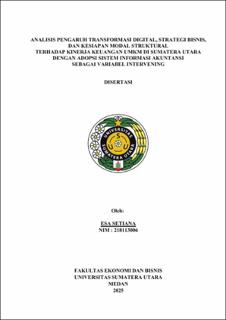Analisis Pengaruh Transformasi Digital, Strategi Bisnis, dan Kesiapan Modal Struktural Terhadap Kinerja Keuangan UMKM Di Sumatera Utara dengan Adopsi Sistem Informasi Akuntansi Sebagai Variabel Intervening
Analyze the Influence of Digital Transformation, Business Strategy and Structural Capital Readiness on the Financial Performance of Msmes in North Sumatra With the Adoption of Accounting Information Systems as an Intervening Variable

Date
2025Author
Setiana, Esa
Advisor(s)
Erlina
Badaruddin
Bukit, Rina
Metadata
Show full item recordAbstract
This study aims to analyze the influence of digital transformation, business strategy
and structural capital readiness on the financial performance of MSMEs in North
Sumatra with the adoption of accounting information systems as an intervening
variable.
The technique used to select samples in this study was stratified random sampling, so
that the total sample in this study was 409 MSME respondents in North Sumatra. Data
were collected through questionnaires and interviews and analyzed using the
Structural Equation Modeling-Partial Least Squares (SEM-PLS) WarpPLS 8.0
method for quantitative data and Nvivo software for qualitative data.
The results of the study indicate that digital transformation, business strategy,
structural capital readiness and adoption of accounting information systems have a
positive and significant effect on the financial performance of MSMEs. Then for the
intervening variables, the three variables, namely digital transformation, business
strategy and structural capital readiness have a positive and significant effect on the
adoption of MSME accounting information systems. Furthermore, the results of the
study indicate that all variables, both digital transformation, business strategy and
structural capital readiness have a positive and significant effect on the financial
performance of MSMEs through the adoption of accounting information systems.
This finding indicates that the adoption of accounting information systems
significantly mediates the relationship between digital transformation, business
strategy, and structural capital readiness on the financial performance of MSMEs. The
practical implication is that the adoption of accounting information systems is no
longer just a recording tool, but a strategic component in data-based business decision
making. This makes accounting a managerial tool and not just reporting
This study also provides significant contributions to the development of Private Entity
Financial Accounting Standards (SAK EP) and Micro, Small, and Medium Entity
Financial Accounting Standards (SAK EMKM), especially in the context of
implementing the adoption of digital-based accounting information systems (AIS).
Based on the findings that the adoption of accounting information systems
significantly increases the efficiency, accuracy, and transparency in MSME financial
reporting, there is empirical justification to encourage adjustments to SAK EMKM to
be more adaptive to the digitalization of recording and reporting.
